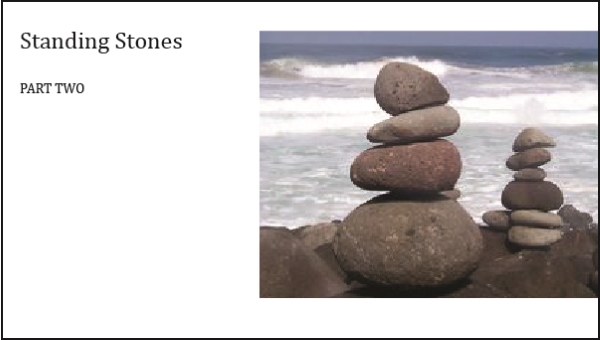By Tyson Thorne

Standing stones are important, but equally important are the words Jacob spoke about that place. He named it Beth-El. It is a compound word, “beth” (pronounced “bait” in Hebrew) meaning house, and “El” which was the common name for God. Together they mean “House of God” which to my way of thinking is odd. How can a place outside, in the wilderness, be a “house”? The answer is given by the wisest man who ever lived. Solomon asks himself “Will the Lord God dwell in a house built be the hands of men?” The place is unimportant; where the Lord dwells is his home. That can be in a wilderness, it can be in a pillar of fire by night and a cloud by day. It can be upon a golden ark or a temple adorned as no other. Home isn’t where you hang your hat; it’s where the presence of the Lord is!
Too often we think of a building as the house of God. Yet I put to you this morning the words of author Madeleine L’Engle:
“Sometimes the very walls of our churches separate us from God and each other. In our various naves and sanctuaries we are safely separated from those outside, from other denominations, other religions, separated from the poor, the ugly, the dying… We need to remember that the house of God is not limited to a building that we usually visit for only a few hours on Sunday. The house of God is not a safe place. It is a cross where time and eternity meet, and where we are — or should be — challenged to live more vulnerably, more interdependently.” -- A Stone for a Pillow, Madeleine L’Engle, © Crosswicks 1986
And so I want to put to you today two truths:
First, standing stones are not ridged constructs, but a living part of our faith and our lives. Consider who in your life has become a standing stone. Ask yourself, “In what way is my life a standing stone to someone else?” Sometimes a standing stone can be a journal, a place where you record your walk with God. Sometimes it is a date — a time of year when you search yourself and open yourself up to God for direction and insight. A standing stone can be many things.
Second, like standing stones the house of God is not a ridged construct. It can be any place where we meet God. Sometimes, as in Jacob’s case, it can be a one-on-one encounter. But more often than not the House of God is among people, plural. It is a place where God’s children assemble to remember God’s goodness and to give him honor and glory and praise! The house of God, the church, is not this building or any other. I echo the words of Solomon:
“O LORD, God of Israel, there is no God like you in all of heaven and earth. You keep your covenant and show unfailing love to all who walk before you in wholehearted devotion. You have kept your promise to your servant David, my father. You made that promise with your own mouth, and with your own hands you have fulfilled it today… But will God really live on earth among people? Why, even the highest heavens cannot contain you. How much less this Temple I have built! Nevertheless, listen to my prayer and my plea, O LORD my God. Hear the cry and the prayer that your servant is making to you.” -- 2 Chronicles 6.14-.19, passage not quoted in its entirety.
Like Jacob before him, Solomon understood the House of God can be any place — a wilderness, a desert, a forest or a temple; and the memory of God’s loving faithfulness can be evoked by any icon — a stone pillow, an ark overlaid with gold, or even a person.
As you wrestle with hard decisions about life, I want you to remember the lessons of Jacob. Consider the God who meets us not in a place of His special choosing, not on holy ground, but right where we are.
|
|
|
